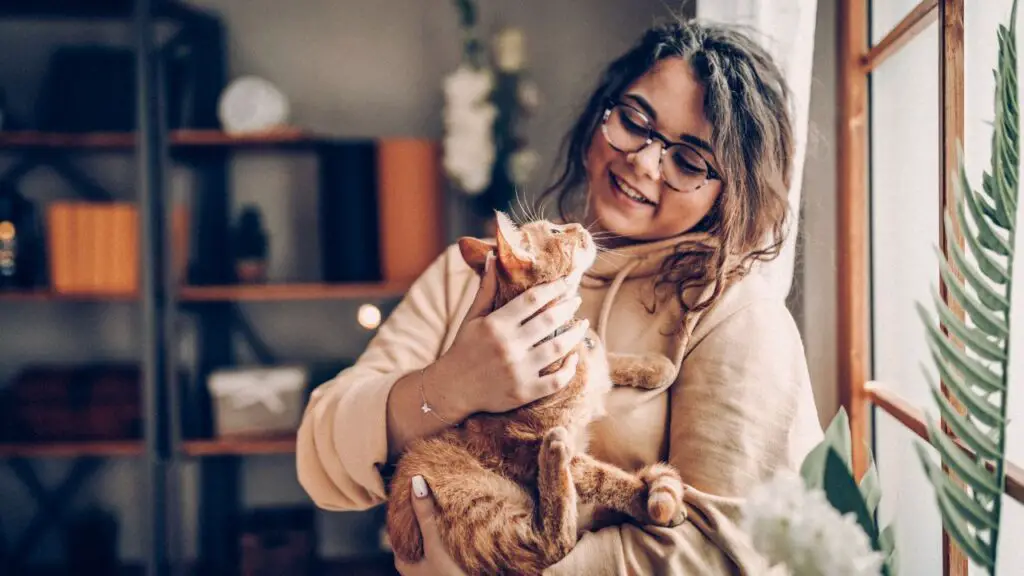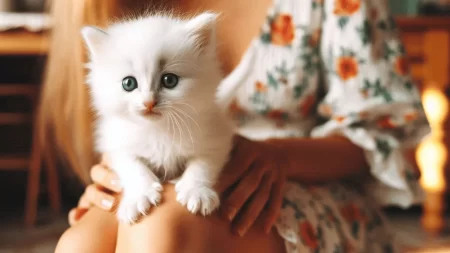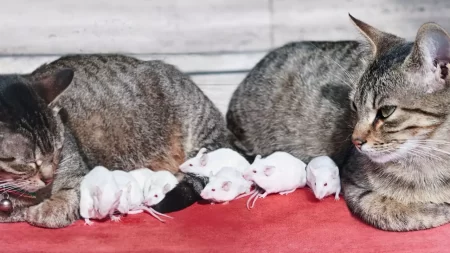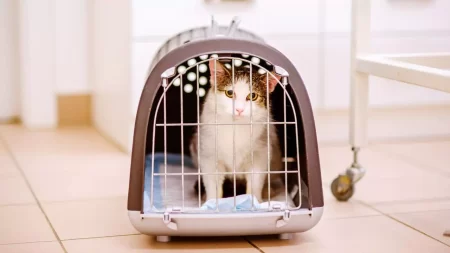There are several possible reasons why your cat watches you eat. Some of them are:
- Your cat likes human food and wants to share some with you.
- Your cat is curious about what you are eating and how you eat it.
- Your cat wants your attention and affection.
- Your cat wants to communicate something with you, such as hunger, boredom, or discomfort.
- Your cat feels insecure or anxious about eating alone and wants your company and protection.
To comprehend why your feline gazes at you while you eat, carefully monitor their physical cues, vocalizations, and actions prior to, during, and following your meal.
Additionally, you could attempt to share some of your food (if it’s safe for them) or engage in playtime with them once you’ve finished eating to gauge their response.
Depending on the underlying cause, you may need to modify their feeding routine, increase environmental stimulation, or seek professional advice from a veterinarian or behaviorist for your cat.
How can I train my cat to stop watching me eat?
Here are some tips for managing your cat’s food-watching behaviour:
- Provide your cat with his food beforehand. Make sure his feeding area is away from where you’re eating.
- Train your cat to sit or play with toys while you eat.
- Put distractions like cat trees, toys or a scratching post in the same room.
- If your cat won’t stop, feed him first or close him in another room until you’re done.
How does my cat’s behavior change when I’m eating something they don’t like?
If your cat doesn’t like what you are eating, they may show some signs of disinterest or displeasure. Some of these signs are:
- Turning away their head or body from you or your food.
- Sniffing your food briefly and then walking away.
- Making a face or licking their lips as if they tasted something bad.
- Scratching or covering your food with their paw as if they were burying it.
- Meowing, hissing, or growling at you or your food.
- Leaving the room or hiding somewhere.
These signs may indicate that your cat finds your food unappealing, offensive, or threatening. They may also be trying to tell you to stop eating it or to give them something else.
Why does my cat sometimes try to steal my food while watching me eat?
Various factors may lead your cat to attempt food theft during your mealtime.
They might appreciate the flavor of human cuisine, feel hungry or possess a speedy metabolism, or simply be intrigued by your meal due to boredom.
Occasionally, cats may imitate your actions or seek connection, while at other times, they could be asserting their dominance or competing for sustenance.
To better comprehend your cat’s conduct, observe their physical cues, vocalizations, and actions before, throughout, and following meals.
Moreover, you can give them a portion of your meal (if it’s harmless) or engage them in play after eating to gauge their response.
Why does my cat sometimes paw at me while watching me eat?
Your cat may paw at you while watching you eat for different reasons. Some of them are:
- Your cat wants to get your attention and affection.
- Your cat wants to share some of your food or get a taste of it.
- Your cat wants to play with you or your food.
- Your cat is bored or curious and wants to explore your food.
- Your cat is trying to communicate something with you, such as hunger, boredom, or discomfort.
What does it mean when my cat licks its lips while I eat?
Your cat may lick its lips while you eat for a variety of reasons. These include expressing an interest in your food, wanting to taste or share it with you, being hungry or having a high metabolism and needing more food, feeling bored or curious and wanting to explore your food, mimicking your behavior or trying to bond with you by eating what you eat, or feeling nauseous or having a dry mouth and trying to soothe itself.
However, excessive lip licking may signal a dental or oral problem, such as gingivitis, periodontitis, tooth resorption, or oral tumors.
These conditions can cause pain, inflammation, infection, or bleeding in your cat’s mouth.
If your cat exhibits other symptoms, such as drooling, pawing at the mouth, bad breath, difficulty eating, or weight loss, you should consult a veterinarian for a checkup







